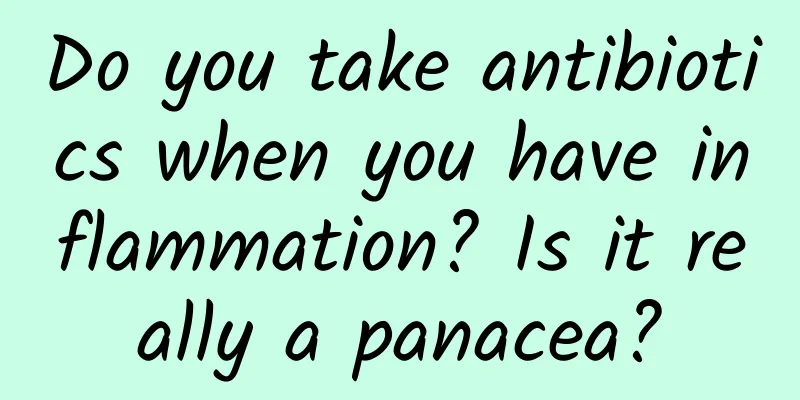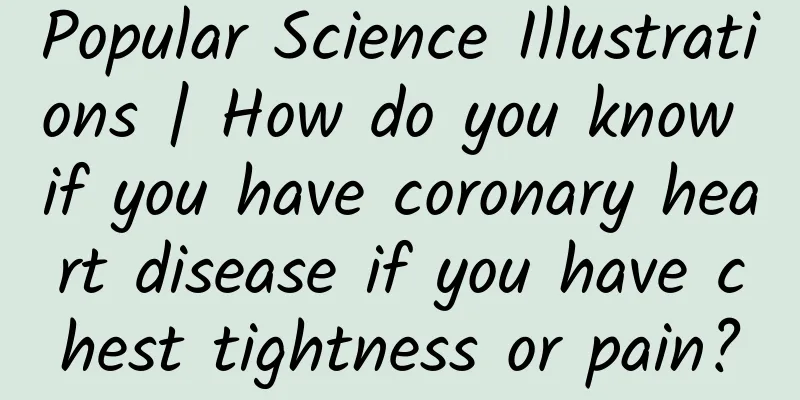Do you take antibiotics when you have inflammation? Is it really a panacea?

|
When you have a cold or fever, some people’s first reaction may be to use antibiotics. When you have a toothache or diarrhea, some people may also think of antibiotics first... What exactly are these “antibacterial drugs” that seem to be omnipotent? When should antibiotics be used? 1. Antibacterial drugs ≠ anti-inflammatory drugs Antibacterial drugs are only effective against bacterial infections. Most "inflammations" are not caused by bacterial infections. For example, rheumatoid arthritis requires anti-inflammatory treatment with non-steroidal anti-inflammatory drugs such as aspirin; allergic rhinitis should be treated with anti-allergic drugs, hormones and other drugs. 2. Antibacterial drugs ≠ cold medicine Colds are caused by a variety of viral infections, and antibiotics are ineffective against cold viruses. During a cold, some symptomatic treatment drugs can be used. For example, if you have headaches and body muscle aches, you can use antipyretic analgesics such as acetaminophen and ibuprofen. Only when you have frequent coughs after a cold, accompanied by yellow, thick sputum, fever, sore throat, etc., and secondary bacterial infections occur, will doctors choose appropriate antibiotics for treatment according to the condition. 3. Do I need to take antibiotics for cough and diarrhea? There are many reasons for coughing, such as viral infection, asthma, cold air stimulation, etc. Bacterial infection is only one of the reasons. In addition to bacterial infection, diarrhea can also be induced by cold, viral infection, food allergy, etc. It is reasonable to use antibiotics to treat cough and diarrhea only when they are caused by bacterial infection. 4. Do I need to use antibiotics after tooth extraction? Whether antibiotics are needed after tooth extraction depends on the bad tooth and the patient's general condition. If the tooth extraction process is simple and the patient is in good physical condition, no antibiotics are needed; if the tooth is inflamed, the tooth extraction causes great trauma, or the patient has poor resistance, antibiotics can be used under the guidance of a doctor. How long do antibiotics need to be used? "All medicines are poisonous", it is wrong to stop taking antibiotics when the symptoms of infection improve slightly. Little do we know that the "symptoms" we call are actually the manifestations of the disease. If the medicine is stopped when the symptoms of infection are alleviated, the bacteria in the infected area will not be completely eliminated, and it is very likely to become a chronic infection. It is like a pile of ashes, there is no spark on the surface, but the inside has not been completely burned. Once there is wind, it may become a "raging fire". Some people also think that the longer you take antibiotics, the better, because they can kill bacteria more thoroughly. This idea is also wrong. Each antibiotic has a different antibacterial spectrum. For infectious diseases, the site of infection, the amount of infected bacteria, and the type are all significantly different. You must follow the doctor's instructions and do not extend the use of antibiotics at will. There are abundant microorganisms in the human body, and the abuse of antibiotics may lead to dysbacteriosis, antibiotic-related diarrhea, dysbacteriosis, pulmonary fungal infection, severe drug-resistant bacterial infection and other adverse consequences. Antimicrobial drugs are a double-edged sword Proper use of antibiotics can quickly kill pathogenic bacteria and allow our bodies to recover quickly. On the contrary, improper use of antibiotics will threaten our health and disrupt the body's normal flora. While killing bacteria, antibiotics can also cause damage to the human body, affect liver and kidney function, and cause gastrointestinal reactions. 1. Follow your doctor’s advice Listen to your doctor, take medicine according to the complete prescription, use antibiotics in sufficient doses and for sufficient courses, do not buy antibiotics at will, and do not take antibiotics at will. 2. Love hygiene Wash your hands frequently to maintain hygiene and avoid bacterial infection. 3. Exercise more Do more exercise to strengthen your body and enhance your resistance. |
<<: Interesting Medicine Talk | Gliquidone (with audio)
>>: What changes occur in the body when a stroke "strikes"?
Recommend
White stuff on vulva and itching
For women, in fact, they need to know some method...
You can stock up on nonsteroidal anti-inflammatory drugs, but don’t take them randomly
This is the 4164th article of Da Yi Xiao Hu After...
Abdominal pain after abortion
Nowadays, there are many people who have unexpect...
What is the best contraceptive method?
Many modern families do not want to have a second...
Acid reflux and burning throat in late pregnancy
The changes in the body's growth hormone duri...
One month after the abortion, I suddenly started bleeding again.
Medical abortion is still very harmful to women. ...
It has been clean for 3 days and there is red blood after vaginal ultrasound
Female friends must pay attention to the cleanlin...
What to use to wash women's underwear
It is best not to use the same detergent to clean...
When will Huawei MateBook X Pro 2020 be released? What is the configuration of Huawei MateBook X Pro 2020?
At the Huawei 5G conference on the evening of Feb...
Can Trichomonas vaginitis be treated with Chinese medicine?
Vaginitis is the most common gynecological diseas...
Why can't you have sex before getting an IUD?
IUDs can be effective for birth control, and thei...
What causes chest pain during six months of pregnancy?
Pregnancy is a very difficult process for women. ...
What is the matter with superconducting visual flow?
Abortion is a common surgery. Women need to be ca...
Is breast cancer contagious by eating together?
Can breast cancer be transmitted by eating togeth...
What to do when you have menstrual pain? This can help relieve it
Dysmenorrhea is a very common phenomenon among wo...









